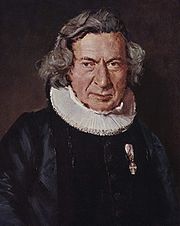
Andreas Gottlob Rudelbach
Encyclopedia

Copenhagen
Copenhagen is the capital and largest city of Denmark, with an urban population of 1,199,224 and a metropolitan population of 1,930,260 . With the completion of the transnational Øresund Bridge in 2000, Copenhagen has become the centre of the increasingly integrating Øresund Region...
September 29, 1792; died at Slagelse
Slagelse
Slagelse, a town in east Denmark, is in Slagelse municipality on the island of Zealand. It is about 100 km southwest of Copenhagen. The population is 31,979 ....
(50 m. s.w. of Copenhagen), Zealand, March 3, 1862. He was educated at the university of his native city, where he became privatdozent
Privatdozent
Privatdozent or Private lecturer is a title conferred in some European university systems, especially in German-speaking countries, for someone who pursues an academic career and holds all formal qualifications to become a tenured university professor...
. During this period he edited, in collaboration with N. F. S. Grundtvig, the Theologisk Maanedskrift (13 vols., 1825 sqq.), and in 1829 was called to the pastorate of Glauchau
Glauchau
Glauchau is a town in Germany, in Saxony, on the right bank of the Mulde, 7 miles north of Zwickau and 17 miles west of Chemnitz by rail. It is part of the Zwickau district....
, Saxony, where he powerfully aided religious awakening and revolt against the rationalism
Rationalism
In epistemology and in its modern sense, rationalism is "any view appealing to reason as a source of knowledge or justification" . In more technical terms, it is a method or a theory "in which the criterion of the truth is not sensory but intellectual and deductive"...
of the period, though at the same time he opposed any formal separation from the Lutheran Church. In 1830 he aided in founding the Muldenthal pastoral conference, but opposition gradually developed against him, largely on account of his uncompromising Lutheranism, and in 1845 he gladly resigned his pastorate and returned to Denmark. From 1846 to 1848 he lectured at the University of Copenhagen
University of Copenhagen
The University of Copenhagen is the oldest and largest university and research institution in Denmark. Founded in 1479, it has more than 37,000 students, the majority of whom are female , and more than 7,000 employees. The university has several campuses located in and around Copenhagen, with the...
on dogmatics
Dogmatic theology
Dogmatic theology is that part of theology dealing with the theoretical truths of faith concerning God and his works, especially the official theology recognized by an organized Church body, such as the Roman Catholic Church, Dutch Reformed Church, etc...
and introduction, but the death of his royal patron in the latter year exposed him to the attacks of those who regarded him as a German and a traitor. He accordingly accepted a call to the pastorate of Slagelse
Slagelse
Slagelse, a town in east Denmark, is in Slagelse municipality on the island of Zealand. It is about 100 km southwest of Copenhagen. The population is 31,979 ....
, where he passed the remainder of his life.
He edited the Zeitschrift für die gesammte lutherische Theologie und Kirche (in collaboration with H. E. F. Guericke
Heinrich Ernst Ferdinand Guericke
Heinrich Ernst Ferdinand Guericke , was a German theologian.He was born at Wettin in Saxony and studied theology at the University of Halle, where he was appointed professor in 1829...
, Leipzig, 1839 sqq.) and Christliche Biographie, i (1849), and wrote, in addition to the works already mentioned and several volumes of sermons: Hieronymus Savonarola und seine Zeit (Hamburg, 1835); Reformation, Luthertum und Union (Leipzig, 1839); Historische-kritische Einleitung in die Augsburgische Konfession (Dresden, 1841); Amtliches Gutachten über die Wiedereinführung der Katechismus-Examina im Königreich Sachsen, nebst historischer Erörterung der Kathechismus-Anstalten in der evangelisch-lutherischen Kirche Deutschlands (1841); and Om Psalme-Literaturen og Psalmebogs-Sagen, historisk-kritiske Undersögelser (Copenhagen, 1856).

